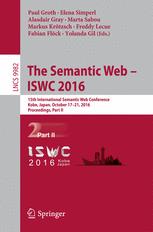

Most ebook files are in PDF format, so you can easily read them using various software such as Foxit Reader or directly on the Google Chrome browser.
Some ebook files are released by publishers in other formats such as .awz, .mobi, .epub, .fb2, etc. You may need to install specific software to read these formats on mobile/PC, such as Calibre.
Please read the tutorial at this link: https://ebookbell.com/faq
We offer FREE conversion to the popular formats you request; however, this may take some time. Therefore, right after payment, please email us, and we will try to provide the service as quickly as possible.
For some exceptional file formats or broken links (if any), please refrain from opening any disputes. Instead, email us first, and we will try to assist within a maximum of 6 hours.
EbookBell Team

5.0
80 reviewsThe two-volume set LNCS 9981 and 9982 constitutes the refereed proceedings of the 15thInternational Semantic Web Conference, ISWC 2016, which was held in Kobe, Japan, in October 2016. The 75 full papers presented in these proceedings were carefully reviewed and selected from 326 submissions.
The International Semantic Web Conference is the premier forum for Semantic Web research, where cutting edge scientific results and technological innovations are presented, where problems and solutions are discussed, and where the future of this vision is being developed. It brings together specialists in fields such as artificial intelligence, databases, social networks, distributed computing, Web engineering, information systems, human-computer interaction, natural language processing, and the social sciences.
The Research Track solicited novel and significant research contributions addressing theoretical, analytical, empirical, and practical aspects of the Semantic Web. The Applications Track solicited submissions exploring the benefits and challenges of applying semantic technologies in concrete, practical applications, in contexts ranging from industry to government and science. The newly introduced Resources Track sought submissions providing a concise and clear description of a resource and its (expected) usage. Traditional resources include ontologies, vocabularies, datasets, benchmarks and replication studies, services and software. Besides more established types of resources, the track solicited submissions of new types of resources such as ontology design patterns, crowdsourcing task designs, workflows, methodologies, and protocols and measures.